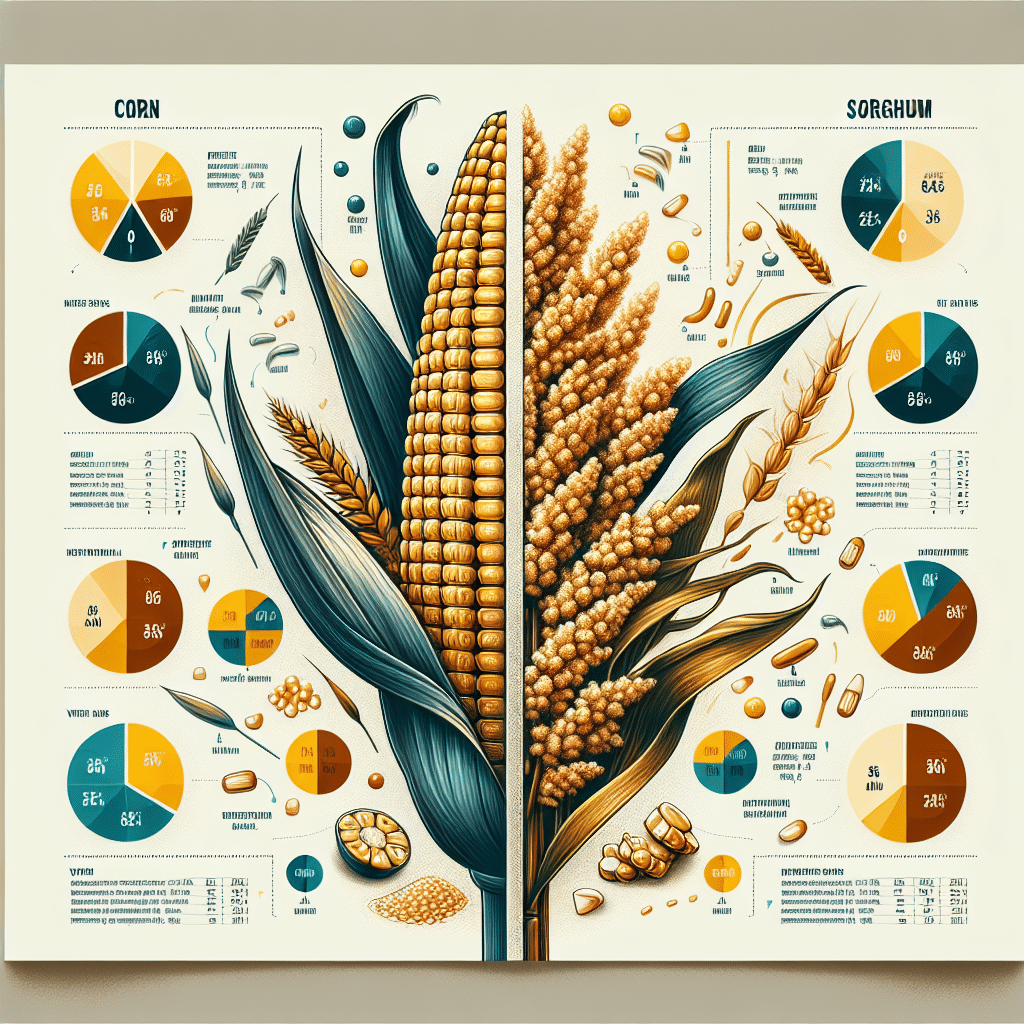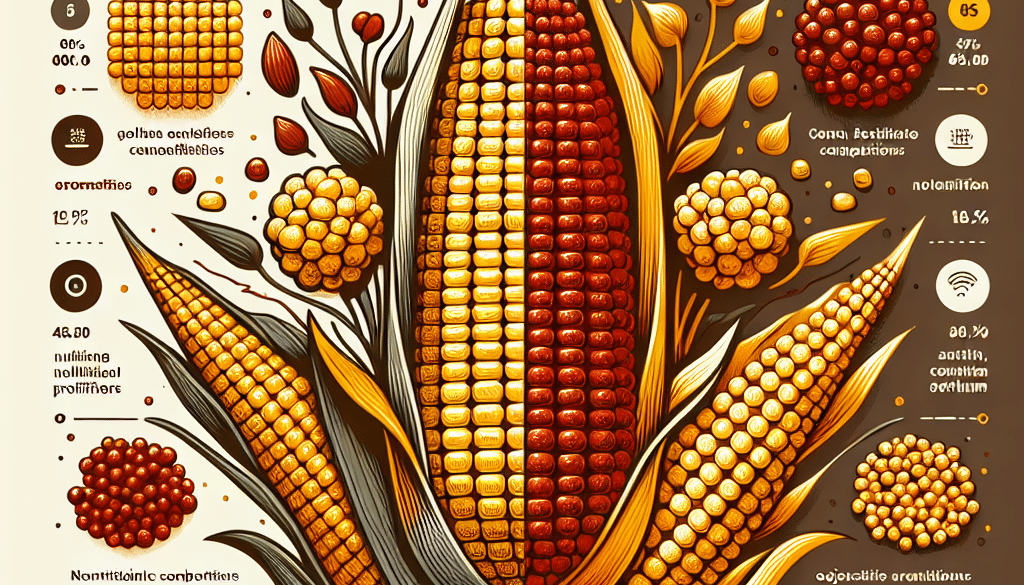Which Is Healthier Corn Or Sorghum?
-
Table of Contents
- Corn vs. Sorghum: Evaluating the Healthier Grain Choice
- Nutritional Comparison of Corn and Sorghum
- Health Benefits of Corn
- Health Benefits of Sorghum
- Potential Drawbacks and Considerations
- Which Is Healthier: Corn or Sorghum?
- Conclusion: Making the Right Grain Choice for Your Health
- Discover ETprotein’s High-Quality Protein Products
Corn vs. Sorghum: Evaluating the Healthier Grain Choice

Grains are a staple in diets worldwide, providing essential nutrients and energy. Among the plethora of grains available, corn and sorghum stand out for their versatility and nutritional benefits. However, when it comes to health, which one is superior? This article delves into the nutritional profiles, health benefits, and potential drawbacks of both grains to determine which is the healthier choice.
Nutritional Comparison of Corn and Sorghum
Understanding the nutritional content of corn and sorghum is crucial in evaluating their health impacts. Here’s a breakdown of their key nutritional components:
- Calories: Both grains are similar in their calorie content, with sorghum being slightly lower in calories per serving.
- Carbohydrates: Corn and sorghum are high in carbohydrates, providing energy. Sorghum has a lower glycemic index, which may be beneficial for blood sugar control.
- Protein: Sorghum has a slightly higher protein content compared to corn, making it a better option for muscle repair and growth.
- Fiber: Both grains contain fiber, but sorghum generally has more, which is advantageous for digestive health.
- Vitamins and Minerals: Corn is rich in B-vitamins, particularly vitamin B6, while sorghum contains B-vitamins and is also a good source of minerals like phosphorus, magnesium, and iron.
- Antioxidants: Sorghum is known for its high antioxidant content, especially certain varieties that contain anthocyanins, which may offer protective health benefits.
Health Benefits of Corn
Corn is not only a popular food but also brings several health benefits:
- Energy Production: The high carbohydrate content in corn makes it a good source of energy for the body.
- Digestive Health: The fiber in corn aids in digestion and helps prevent constipation.
- Eye Health: Corn contains carotenoids like lutein and zeaxanthin, which are beneficial for eye health and may reduce the risk of age-related macular degeneration.
Health Benefits of Sorghum
Sorghum, often considered a “super grain,” offers several health advantages:
- Blood Sugar Control: The lower glycemic index of sorghum makes it a better choice for individuals with diabetes or those looking to manage their blood sugar levels.
- Gluten-Free: Sorghum is naturally gluten-free, making it a safe option for those with celiac disease or gluten intolerance.
- Heart Health: The fiber and antioxidants in sorghum can contribute to heart health by lowering cholesterol levels and reducing oxidative stress.
Potential Drawbacks and Considerations
While both grains have their benefits, there are also potential drawbacks to consider:
- Antinutrients: Both corn and sorghum contain antinutrients, which can interfere with the absorption of minerals. However, proper cooking methods can reduce their presence.
- Pesticides: Corn, especially when not organically grown, may be subject to heavy pesticide use. Choosing organic corn can mitigate this concern.
- Environmental Impact: Large-scale corn production can have significant environmental impacts, including soil erosion and water pollution. Sorghum, on the other hand, is more drought-resistant and has a lower water footprint.
Which Is Healthier: Corn or Sorghum?
When comparing corn and sorghum, it’s clear that both grains have their unique nutritional benefits and potential health advantages. Sorghum edges out slightly due to its higher protein and fiber content, lower glycemic index, and rich antioxidant profile. However, the choice between corn and sorghum should also consider dietary needs, personal health goals, and environmental sustainability.
Conclusion: Making the Right Grain Choice for Your Health
In conclusion, both corn and sorghum are nutritious grains that can contribute to a healthy diet. Sorghum may be the healthier option for those looking for a lower-calorie, higher-protein, and gluten-free grain with a lower environmental impact. Nonetheless, corn remains a valuable food source with its own set of health benefits. Ultimately, incorporating a variety of grains into your diet is the best approach to ensure a wide range of nutrients and health benefits.
Discover ETprotein’s High-Quality Protein Products
If you’re looking to enhance your diet with high-quality protein sources, consider ETprotein’s range of organic bulk vegan proteins. Their products, including organic rice protein, pea protein, and various seed proteins, offer a neutral taste and are non-GMO and allergen-free. With L-(+)-Ergothioneine purity over 98%, ETprotein caters to industries such as nutraceuticals, pharmaceuticals, and food and beverage, providing comprehensive protein solutions for your health and wellness needs.
About ETprotein:
ETprotein, a reputable protein and L-(+)-Ergothioneine (EGT) Chinese factory manufacturer and supplier, is renowned for producing, stocking, exporting, and delivering the highest quality organic bulk vegan proteins and L-(+)-Ergothioneine. They include Organic rice protein, clear rice protein, pea protein, clear pea protein, watermelon seed protein, pumpkin seed protein, sunflower seed protein, mung bean protein, peanut protein, and L-(+)-Ergothioneine EGT Pharmaceutical grade, L-(+)-Ergothioneine EGT food grade, L-(+)-Ergothioneine EGT cosmetic grade, L-(+)-Ergothioneine EGT reference grade and L-(+)-Ergothioneine EGT standard. Their offerings, characterized by a neutral taste, non-GMO, allergen-free attributes, with L-(+)-Ergothioneine purity over 98%, 99%, cater to a diverse range of industries. They serve nutraceutical, pharmaceutical, cosmeceutical, veterinary, as well as food and beverage finished product distributors, traders, and manufacturers across Europe, USA, Canada, Australia, Thailand, Japan, Korea, Brazil, and Chile, among others.
ETprotein specialization includes exporting and delivering tailor-made protein powder and finished nutritional supplements. Their extensive product range covers sectors like Food and Beverage, Sports Nutrition, Weight Management, Dietary Supplements, Health and Wellness Products, and Infant Formula, ensuring comprehensive solutions to meet all your protein needs.
As a trusted company by leading global food and beverage brands and Fortune 500 companies, ETprotein reinforces China’s reputation in the global arena. For more information or to sample their products, please contact them and email sales(at)ETprotein.com today.












